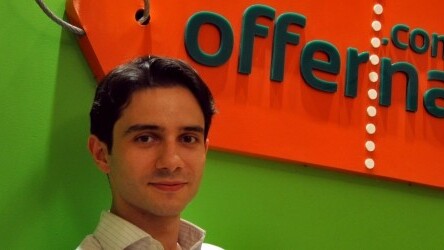
Born in Jordan, of Syrian origin, raised in Canada and studied and worked in the US, Sinan Khatib now calls Cairo home. He recently joined the Egyptian group-buying site Offerna, bringing with him the perfect balance of an understanding of the western e-commerce business model and how to adapt this to suit a local Egyptian audience.
With experience as a lawyer and an investment banker, Khatib realized that he was on the wrong side of the business tracks. “The closest I could get to being creative was to build,” he explains.
So he made an entrepreneurial shift, and the first venture he started with was BuyWithMe, which is now the third most popular group-buying site after Groupon and Living Social. Giving us an idea of what attracted him to the industry itself, Khatib explains the rudimentary beginnings of group-buying in China. A large group of about 40 or 50 people would visit a restaurant, and tell the manager that they would all have lunch there if the restaurant was willing to give them a discount. He calls it group-buying in a more primitive form.
Khatib started exploring the various models of group-buying and eventually settled on joining the BuyWithMe team as the Head of Business Development. But it wasn’t easy, with Groupon clearly in the lead.
“There’s such a boom in the Internet sector. The historic route for so many of these young people coming out of business schools in the US was to go to Wall Street, but now they’re seeing these catchy flash names of young folks who have turned billionaires over night and so there’s this move from offline to online,” Khatib explained.
He continued, “The competition is fierce. You’re ending up seeing small incremental business model changes to existing concepts, not any massive changes except once in a blue moon. You can name the ones that have really changed the game – like Groupon or Facebook. There’s a handful.”
And for every Groupon and Facebook, there are thousands of startups that have ended up going nowhere very fast, a fact which Khatib is very aware of. “The statistical probability, no matter how bright you are, of landing into the success range is not impossible. But what I found to be particularly high, was to take a business model that works in the US and go to a new market.”
Localizing Group-Buying for an Egyptian Market
That is what brought Khatib to Egypt. Group-buying has certainly taken off in the Middle East, and the market is crowded with many competitors including the recently acquired GoNabit. He provides something of a guideline to one of the ways a startup is more likely to succeed in a new market. The first step is look for the business model. “What are the business models that work best in the US, the ones that are definitively successful?”
Once you’ve figured that out, the next step is simple.“Go to a new market where all the growth rates and demographics are in your favour and the wind is at your back. Have a competitive advantage – which is that you know the western e-commerce model, but you speak the language, you know the native and local dynamics. Don’t photocopy it – localize it. Then have the big guys in the west start buying you out.”
Localizing the concept has its challenges, particularly when it comes to operations. All e-commerce sites in the Middle East have had to adapt the existing model to suit a customer-base that might not necessarily be comfortable sharing their credit card information online.
“In the US, it’s all about credit cards. Here, two thirds of the purchases that are happening on e-commerce sites are COD. It’s a totally different dynamic.” And that isn’t the only challenge. Khatib lists other challenges a US startup could face trying to make it in Cairo – navigating the neighbourhoods and hiring the right sales staff alone would be complex and potentially disastrous.
That’s where a site like Offerna comes in. “The real massive value that people who understand how to localize appropriately and can deliver to the big guys, would be operations. How hard is it to create a landing page, to have SEO and offline marketing – that’s global thinking. Everyone’s doing it the same way. Groupon can sort that out on their own. What they cannot sort out themselves is operations and that is the key to why no one other than Egyptians could make this work. I would even go so far as to say even other Arabs in general would struggle. It won’t be impossible, but it would be a struggle. Let alone someone who doesn’t speak Arabic.”
Localization of an e-commerce site goes much further than just dealing with customers and payment methods. “In the US, local merchants are unsophisticated, you can’t imagine how unsophisticated they are in the third world. With all due respect, it’s rough. You’re not dealing with the most cutting edge people in the world. They’re old school. You have to know the dynamic of the local merchant. Every local merchant has a different psychology – how much can you push and pull, how in touch are they with new modern ways of doing business.”
Dealing with local merchants has been an educational experience, for all involved. Offerna has been playing a significant role in giving merchants new and dynamic ways of dealing with their customers, and in the process, building a loyal consumer base.
There is a lot more that has be considered when localizing a business model, and ensuring its continued success, according to Khatib. There are many questions you have to ask yourself. “What are the product permutations that are better for Egypt? What are the ways that we can communicate to our audience that makes better sense? No doubt there are peculiarities that we are mindful of. For example, using provocative language. You have to be mindful of those things, where you could end up offending your entire customer base with the use of just one wrong word. That’s the level of the specificity we go to to make sure we’re not messing up.”
Where is Offerna Headed Now?
Now that Khatib is on board with the Offerna team, we asked him about his immediate plans for the site. “The key to this business is having amazing deals. I’ve seen daily deals pages that are ugly and disasters but they are able to sell like wildfire. The most beautiful page on earth with crappy deals won’t sell anything. The consumer is going for the substance. My core purpose here is that we develop a sales process and the mechanism by which we are creating and developing high quality deals on a regular basis and an invaluable one, and its very challenging to do, let alone in Egypt.”
Offerna is the leading daily deals site in Cairo, and Khatib is not shy about their plans for the startup. “We are going to own Cairo. In the next two to three months, we’re going elbow out and make sure that no one will feel comfortable in this city. Alexandria will be a close second and we’re already preparing deals for the North Coast. And we’re also looking to Saudi Arabia.”
Khatib sees that Offerna has a distinct advantage over other competitors trying to make their way into the Egyptian and Saudi Arabian markets. “We are one of the few executive teams that are all Arabic speakers. We have a competitive advantage relative to the major players. It’s much easier to do business in Dubai than it is in Cairo or Riyadh, if you don’t speak Arabic. So we’re going to where our competitive advantages are. There’s a direct correlation to the fact that the places where you need to be a local and speak Arabic are also the places with the most under-tapped markets . Egypt has 80 million people. Saudi Arabia prints out $250 billion of oil money every year.”
Is it Going to Last?
Quite a bit has been said about Groupon’s longevity, or as some have theorized, it’s lack of staying power. Khatib is quick to dismiss this theory.
“There’s been plenty of articles that shoot the business model down. When I was at BuyWithMe, overwhelmingly the merchants wanted to do it again. Getting the customer doesn’t strike me to be the problem. Getting the deals is. If you have merchants saying they want to do this again, where is this issue?
Someone might come and say, this won’t remain exciting forever, I agree with that. But there’s product permutations. This business is going to have a lot of changes. A company like Groupon is 2 years old and has 4,000 employees – tip your hat before trashing them.”
It’s All About Personalization
So what permutations does Khatib envision for the daily deals model? It’s all about personalization. “The competition for the inbox has gone north. If you’re a private sales company, a dating site, a daily deals site – all you guys are competing for that same inbox.”
Khatib explains, rather than throwing every deal at every customer, daily deals sites have the potential to study and understand each person’s behaviour, and only offer deals that are of obvious interest. In other words, targeted marketing.
LivingSocial has acquired GoNabit. Now what?
The GoNabit acquisition is a hugely positive step for the Middle Eastern market, according to Khatib. “This is wonderful news. It gives validation to the idea that e-commerce in the Middle East is viable. International players are looking to the Middle East and are seeing small players who have organically grown as prospective acquisition targets,” and his hope is that this is just the beginning of a long list.
And Khatib is optimistic about the future. The acquisition may be just the push that is needed for other local and regional entrepreneurs to take the plunge. “It encourages and inspires young entrepreneurs to build, knowing that there’s bigger businesses, whether international or local, who will want to acquire them.”
Get the TNW newsletter
Get the most important tech news in your inbox each week.





